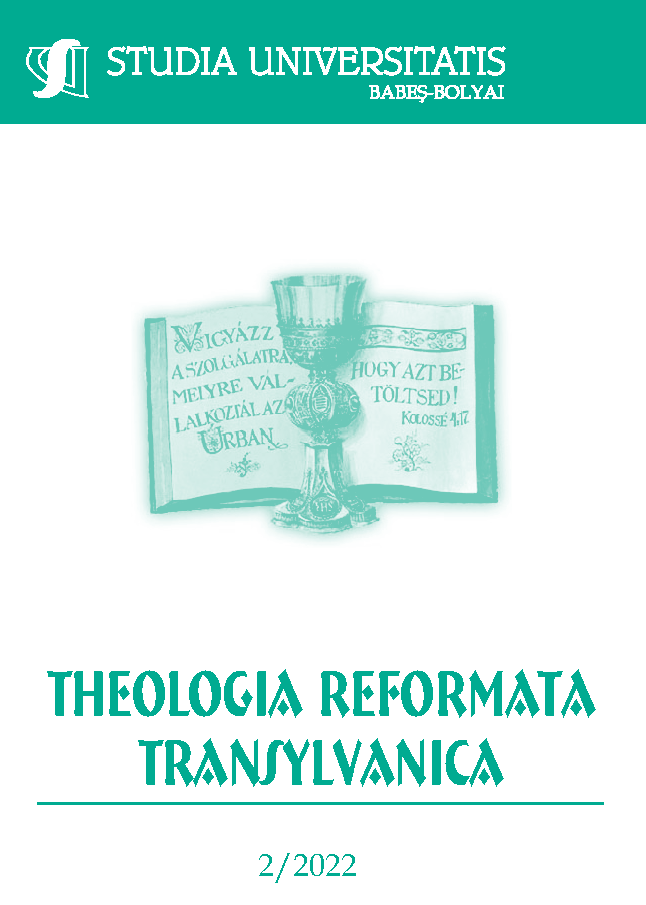Merleau-Ponty’s Relational Responsibility in the Work of Leading Ethicists Lisa S. Cahill and Eva F. Kittay
DOI:
https://doi.org/10.24193/subbtref.67.2.04Keywords:
embodiment, Lisa S. Cahill, Eva F. Kittay, society, relationality, careAbstract
Aim. Maurice Merleau-Ponty in his Phenomenology of Perception observes the way that beings are dynamically interconnected: “I discover in that other body a miraculous prolongation of my own intentions… As the parts of my body together comprise one system, so my body and the other person’s are one whole.” What Merleau-Ponty calls to our attention here is the embodied and relational way that we are related to others and the world around us. Based upon Merleau-Ponty’s observation of the relational dimension of embodiment, this study is to analyse and evaluate on relationality, which – as we would argue along with social ethicists Cahill and Kittay – is one of the most important anthropological principles for a better-embodied care today. Methods. The study is based on 1) a comparative analysis, which shows the differences and points of contact between Cahill and Kittay on the relational dimension of embodiment, and 2) a critical analysis, which made it possible to identify the shortcomings and advantages in the arguments of the above-mentioned ethicists. Results. The author analysed Merleau-Ponty’s observation of the relational dimension of embodiment in relation to their theories of relationality and ethics. In this way, the specific liberal views of these American philosophers on such issues as relationality, and the values of the embodied care were explicated. Conclusion. Based on Cahill’s and Kittay’s analyses of relationality, influenced by Merleau-Ponty, the contribution of this paper lies in the following observations: 1) we are all relational human persons, based on our nested dependencies; care and attention to the vulnerabilities of dependent persons by the dependency worker and communal trust creates a network of multiple interdependencies that form the central bonds of human social life; 2) the connection between two individuals is an ethical and social relation that not only facilitates but becomes the experience; 3) a well-ordered society where all persons are equal must care and cannot unfairly exploit the disabled, the children, the old, or anyone based upon gender, race, ethnicity, age, or class status and must offer adequate support to dependents and those who care for them in relations of dependency; 4) relational or community participation is essential for hu-man existence and sharing the good life. One way to do so is to get personally engaged to care or to pay attention to those who need us and are dependent on us. The more dependency we have in our life, the more independent we are!
References
CAHILL, L. (1996): Sex, Gender, and Christian Ethics. Cambridge, UK, Cambridge University Press.
DODDS, Susan (2007): Depending on Care: Recognition of Vulnerability and the Social Contribution of Care Provision. In: Bioethics. 21, 6. 500–510.
DUSSEL, E. (1989): Ethics & Community. Maryknoll, NY, Orbis.
FARLEY, M. (2002): Compassionate Respect. New York–Mahwah, N.J., Paulist Press.
FINS, J. (2006): A Palliative Ethics of Care. Sudbury, Jones and Bartlett.
GOODIN, Robert E. (1985): Protecting the Vulnerable: A Reanalysis of Our Social Responsibilities. Chicago–London, University of Chicago Press.
JENNINGS, B. – KAEBNICK, G. E. – MURRAY, T. H. (2005): Improving End of Life Care: Why Has It Been So Difficult? In: The Hastings Center Report. 35, 6. 2–4.
HOCHSCHILD, A. R. (1983): The Managed Heart: Commercialization of Human Feelings. University of California Press.
KITTAY, F. (2003): Love’s Labor: Essays on Women, Equality and Dependency. London, Routledge: J.A. Parks.
LOJAN, R. (2016): The Imperative of Social Responsibility for Taking Care of Seriously Ill and Dying. In: Zarządzanie i edukacja. 108, s. 95–104.
(2018) Personal Awareness in Palliative Care Practice. In: HOLONIČ, Ján (ed.): Die wirtschaftliche Entwicklung europäischer Regionen in der Ausbildungs- und Arbeitsmarktpolitik: Übergänge und Strategien 5. Uzhorod (Ukraine): TOV „RiK – U“.
MERLEAU-PONTY M. (2002): The Phenomenology of Perception. London, Routledge – Kegan Paul.
RUDDICK, Sara (2002): An Appreciation of Love’s Labor. In: Hypatia. 17, 3(Summer). 214–223.
TAYLOR, Carol – DELL’ORO, Roberto (eds.) (2006): Health and Human Flourishing: Religion, Medicine and Moral Anthropology. Washington, D.C., Georgetown University Press.
VOGT, Ch. P. (2004): Patience, Compassion, Hope, and the Christian Art of Dying Well. Lanham, MD, Rowman – Littlefield Publishers.
WEISS, G. (1999): Body Images: Embodiment as Intercorporeality. Routledge.
Downloads
Published
How to Cite
Issue
Section
License
Copyright (c) 2022 Studia Universitatis Babeș-Bolyai Theologia Reformata Transylvanica

This work is licensed under a Creative Commons Attribution-NonCommercial-NoDerivatives 4.0 International License.






